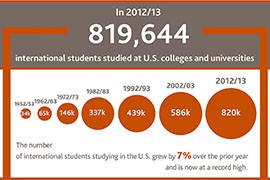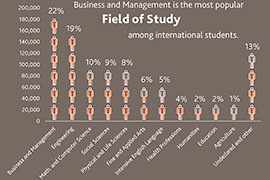Cronkite News has moved to a new home at cronkitenews.azpbs.org. Use this site to search archives from 2011 to May 2015. You can search the new site for current stories.
U.S., Arizona universities set international student enrollment records
WASHINGTON – Arizona universities ranked among the top schools for the number of international students they had enrolled in the 2012-2013 academic year, a new report said.
Arizona State University had the 11th-most international students in the country, with 6,645, up four spots and more than 1,000 students from the year before, according to the Open Doors report.
The report said the University of Arizona was in 38th place, with 3,863 international students, while the Thunderbird School of Global Management and its 651 foreign students were No. 8 on the list of specialized institutions.
It comes as the number of foreign students enrolled at U.S. colleges hit a record high of 819,644 last year, according to the report, released Tuesday by the Institute of International Studies.
Arizona schools, too, had a record number of foreign students last year, with 13,322, the report said. And officials at the schools with the most international students in the state said their relatively high numbers are no accident.
Increasing the number of international students, especially at the undergraduate level, is a goal of top officials at ASU, said Kent Hopkins, the university’s vice provost of enrollment management.
More international students can give all ASU students a more “diverse educational environment,” said Hopkins, who said ASU President Michael Crow has set a goal of 10,000 international students at the university by 2017.
At Thunderbird, the school’s emphasis on global business almost requires a student body drawn from around the globe, an official said.
“Thunderbird is often referred to as a mini-United Nations,” said Rebecca Henriksen, vice president of enrollment and student services management at Thunderbird. “Our students quickly find out that being culturally competent is as important as being academically competent.”
Henriksen said when students work in multicultural teams they can see how people from around the world come up with different solutions to the same problem.
While Thunderbird has a relatively small number of international students compared to the other schools, they make up a whopping 57 percent of the student body. The percentage is even higher in some of the school’s specific degree programs.
Nationally, international students made up 4 percent of the higher education population last year.
The University of Arizona drew students from 108 different countries last year, said Rachel Beech director of international admissions at the school.
More than 32 percent of the international students at a college in Arizona came from China last year, compared to a nationwide average of 29 percent.
While Chinese are the largest group of international students at the University of Arizona, Beech said the school tries not to rely on China but focuses on other countries for recruitment.
“Mexico is one of our target areas,” she said. Beech said the university has a partnership with the Mexican state of Sonora to send Sonoran students to school in Tucson.
Currently there are 149 Mexican students enrolled at the University of Arizona, Beech said. That is roughly the same percentage as the state overall, where Mexican students account for 4 percent of all international students enrolled.
Not only do international students add to the classroom, but they add to the economy as well: The report said foreign students spent $367.9 million in Arizona and $24 billion in the U.S. in the 2012-2013 school year.
The presence of international students on U.S. campuses is important for educational reasons, but also for the future of the country, said Evan Ryan, assistant secretary of state for educational and cultural affairs.
“We know that the skills and the relationships developed through these exchanges are the foundation of our country’s foreign policy,” Ryan said at the report’s release.








